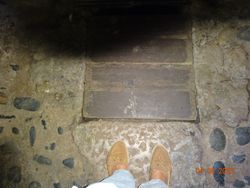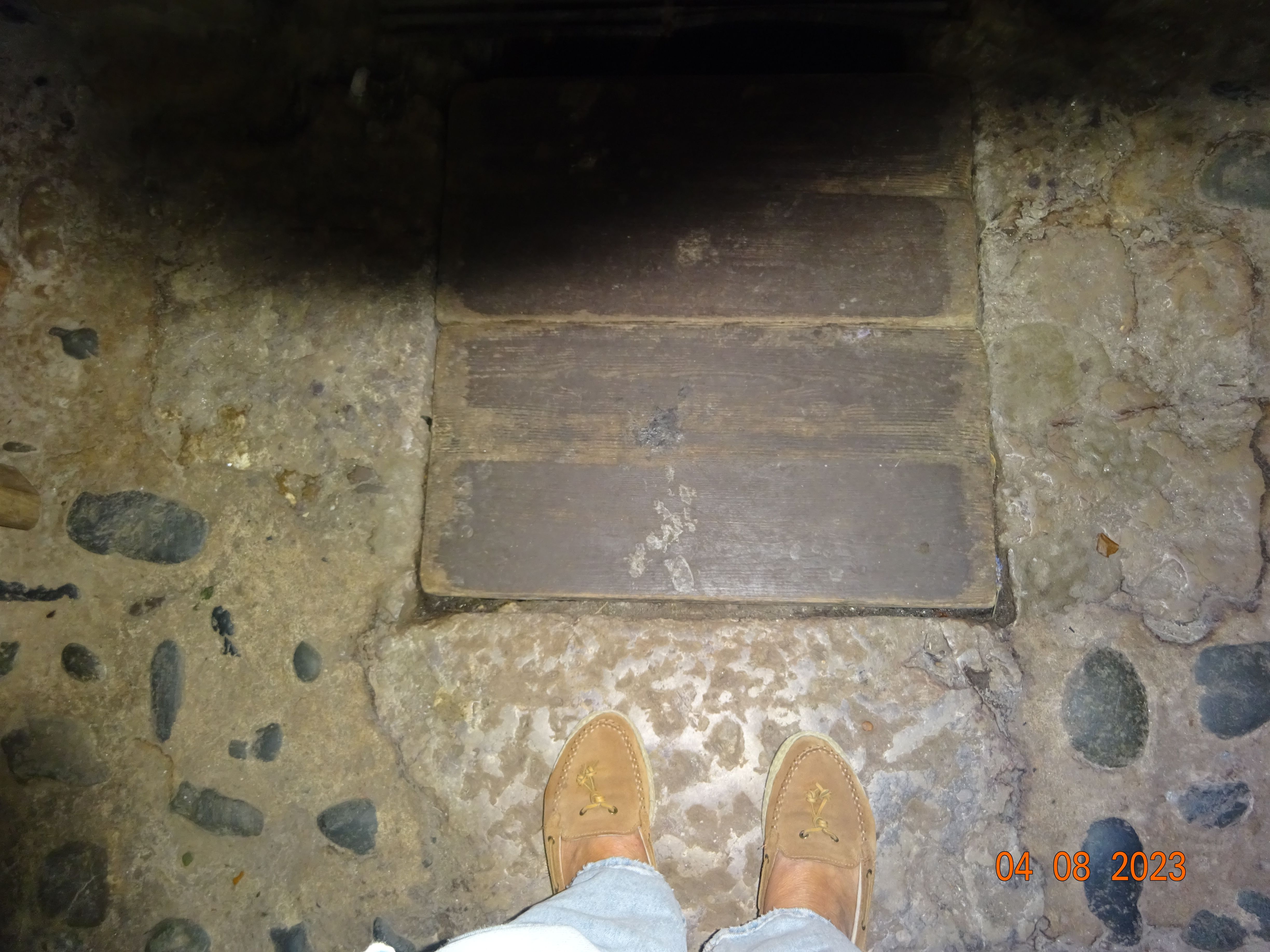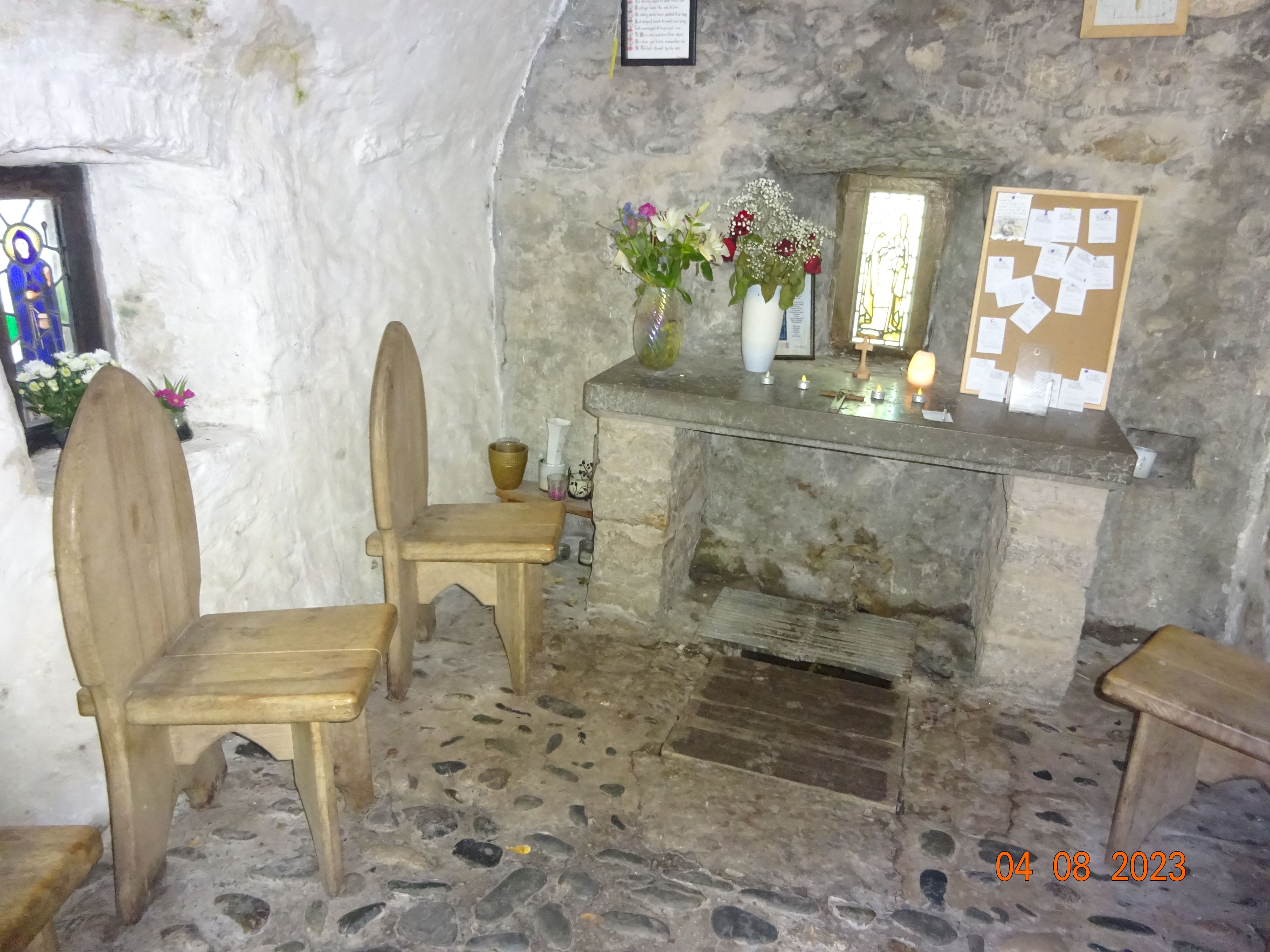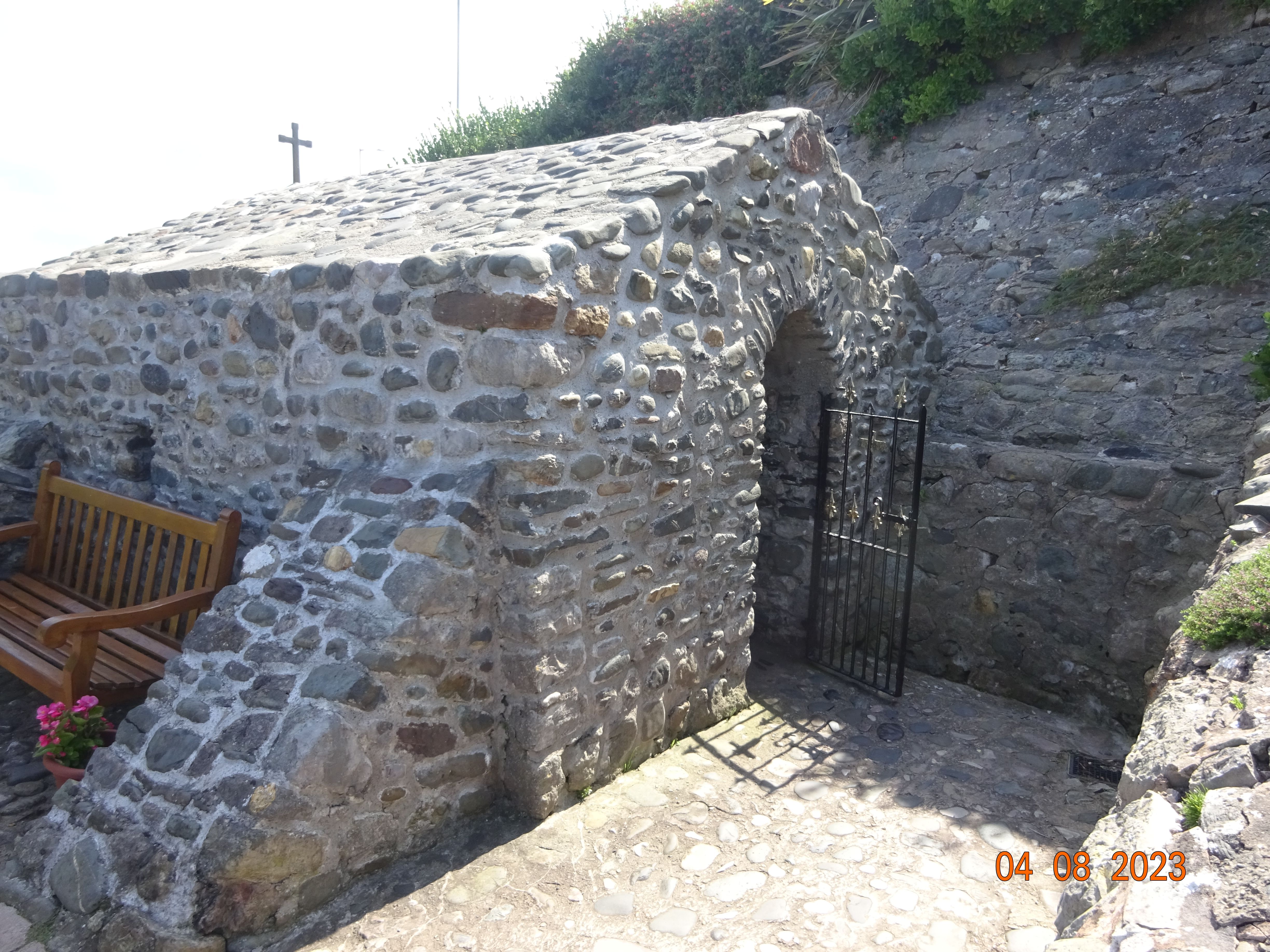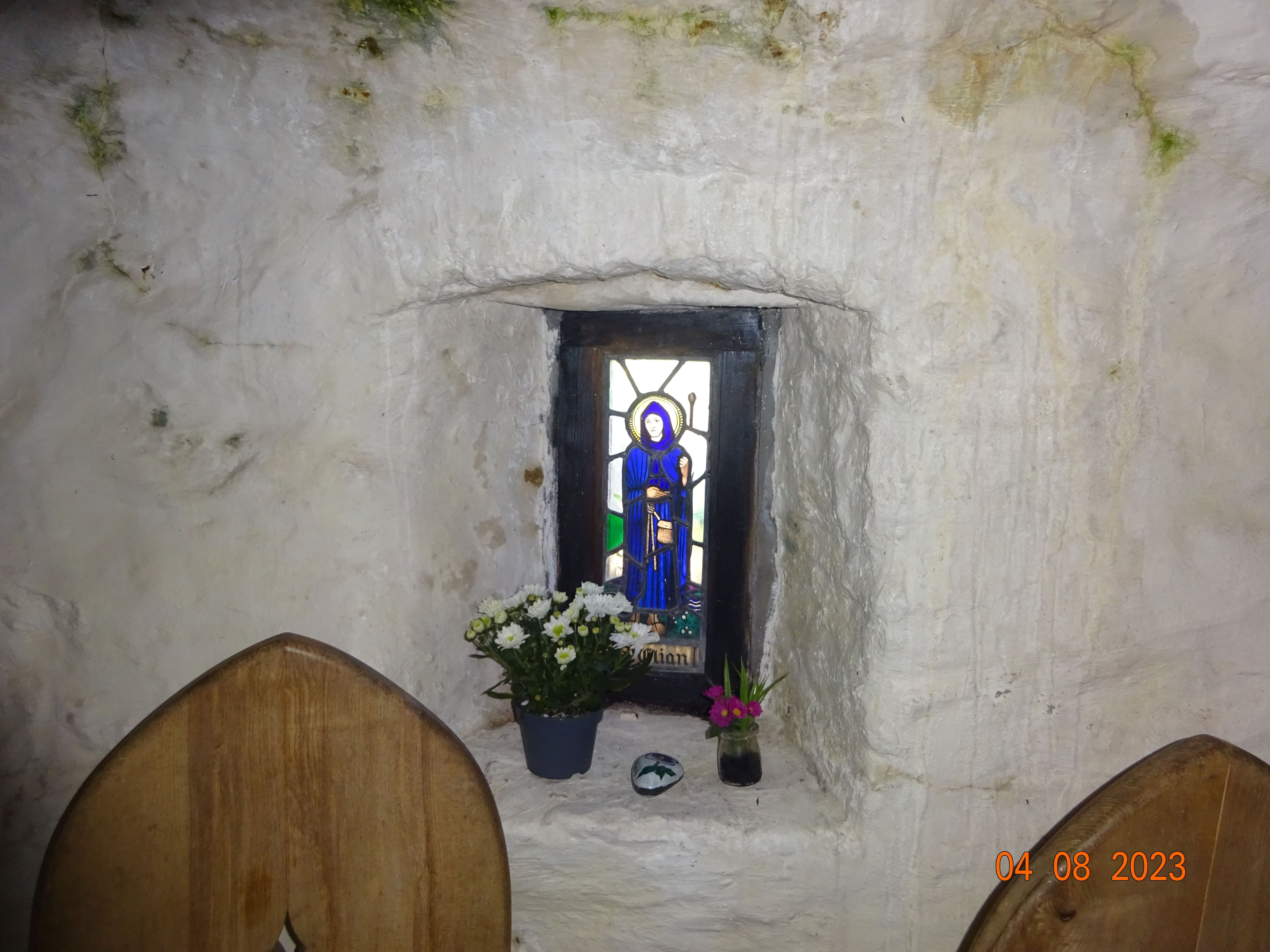Ednyfed was first noticed in battle, fighting Ranulph de Blondeville's army. Ranulph attacked Llywelyn at the request of King John of England. Ednyfed cut off the heads of three English lords in battle and carried them, to Llywelyn, who commanded him to change his family coat of arms to display three heads in memory of the feat.
Ednyfed was married twice, first to Tangwystl Goch ferch Llywarch, of Menai the daughter of Llywarch ap Brân, they had six children. Secondly to Gwenllian, daughter of the prince Rhys ap Gruffydd of Deheubarth they had four children.
In folk tradition, Ednyfed composed a farewell song to Gwenllian before leaving to take part in the Crusades. He was away for several years, and his family thought him dead. In the old Welsh tale, Gwenllian accepted another offer of marriage. On the wedding night, a 'pitiable beggar' arrived at the house and asked permission to borrow a harp with which to entertain the party with a song. In the legend the beggar sang Ednyfed's Farewell song and as he reached the last verse, removed his hat, revealing himself to be Ednyfed. He sang:
A wanderer I, and aweary of strife,
Get ye gone, if ye so desire;
But if I may not have my own wife
I'll have my own bed, my own house, my own fire!"
Ednyfed then announced to the stunned throng:
"This was the tune 'Farewell' to my dear Gwenllian. Hence let her go with her new husband. My faithful harp, come to my arms
Gwenllian died in 1236. On Llywelyn the Great's death in 1240, Ednyfed continued as seneschal in the service of Llywelyn's son, Dafydd ap Llywelyn, until his own death in 1246. Ednyfed was buried in his own chapel, now Llandrillo yn Rhos Church.
∼https://biography.wales/article/s-EDNY-FYC-1246
Name: Ednyfed Fychan
Spouse: Gwenllian ferch Rhys ap Gruffydd
Child: Angharad ferch Ednyfed Fychan
Child: Tudur ap Ednyfed
Child: Rhys ab Ednyfed
Child: Cynwrig ab Ednyfed
Child: Gruffydd ab Ednyfed Fychan
Child: Howel ap Ednyfed Fychan
Child: Goronwy ab Ednyfed Fychan
Gender: Male
Occupation: noble family of Gwynedd
Area of activity: Politics, Government and Political Movements; Royalty and Society
Author: Glyn Roberts
Ednyfed ap Cynwrig (died 1246), claiming descent from Marchudd, was a member of one of a group of kindreds long settled in Rhos and Rhufoniog. As seneschal (in Welsh, distain) of Gwynedd c. 1215-1246 (Hist. W., ii, 684-5), his political and military services to Llywelyn the Great were rewarded, not only by the grant to Ednyfed himself of bond vills in Anglesey, Nantconwy, Arllechwedd Uchaf, and Creuddyn, but also by the concession, made to all the descendants of Ednyfed's grandfather (Iorwerth ap Gwrgan) that they should for the future hold their lands throughout Wales free from all dues and services other than military service in time of war. This special tenure, known as that of 'Wyrion Eden,' is prominent in the 14th century in the lordship of Denbigh amongst the collateral branches of the family (Survey of Denbigh. lv, 297, 303; Ellis, Tribal Law and Custom, i, 113), Ednyfed's own descendants in the same period are found in the townships of Trecastell, Penmynydd, Erddreiniog, Clorach, Gwredog, Trysglwyn, and Tregarnedd in Anglesey, and in Crewyrion, Creuddyn, Gloddaeth, Dinorwig, and Cwmllannerch in Caernarfonshire (Rec. Caern., passim). They are also found in Llansadwrn in Carmarthenshire and at Llechwedd-llwyfan, Cellan, and Rhyd-onnen in Cardiganshire (Cal. Pat. Rolls, 1225-32, 271; A History of Carmarthenshire, i, 178; Cal. Fine Rolls, 1327-37, 304; Cal. Inquisitions, vii, no. 418; Bridgeman, Princes of South Wales, 264). Even before the conquest of 1282, therefore, Ednyfed's immediate descendants formed a 'ministerial aristocracy' of considerable wealth, and their widespread possessions, combined with the favourable terms on which they were held, made them the forerunners of that class of Welsh squires whose emergence is characteristic of the post-conquest period.
The pedigrees are not in complete agreement about the number of Ednyfed's children, but during the reigns of Dafydd ap Llywelyn and Llywelyn ap Gruffydd (1240-82) several of his sons figure prominently amongst the counsellors of those princes. For some years before his death in 1268, GORONWY AB EDNYFED was seneschal to Llywelyn ap Gruffydd (Hist. W., ii, 743; Litt. Wall., 4, 28, 45). His brother, TUDUR AB EDNYFED, was captured during Henry III's inconclusive campaign against Dafydd ap Llywelyn in September 1245, and was released in May 1247 on swearing fealty to the king. Despite marks of royal favour in the following years, Tudur was one of Llywelyn ap Gruffydd's leading advisers after 1256, succeeding his brother Goronwy as seneschal and remaining faithful to the prince until his death in 1278. His loyalty was emulated by his son HEILYN; he had been a hostage in the king's hands between 1246 and 1263 and he submitted finally to Edward I in 1282 (Litt. Wall., 3-4, 26, 50-2, 77, 85, 97-9, 101-3, 109, 111-3; Cal. Close Rolls, 1242-7 (369, 457, 510), 1247-51 (5, 72, 518), 1256-9 (184, 207), 1261-4 (207); Cal. Pat. Rolls, 1232-47 (466, 496), 1258-66 (248); Assize Roll, 9, 14, 118-22, 157, 261; Rec. Caern., 210-11). The Goronwy ap Heilyn of the period 1277-82 (Assize Roll, passim) was probably not of this line. Other sons of Ednyfed in the following of the later princes of Gwynedd were HYWEL (bishop of S. Asaph, 1240-7), CYNWRIG, and RHYS (Thomas, A History of the Diocese of St. Asaph, i, 215; Litt. Wall., passim). For Gruffydd ab Ednyfed and his descendants, see under Sir Gruffydd Llwyd (died 1335).
From Goronwy ab Ednyfed (died 1268) were descended the 'Tudor's of Penmynydd.' His son, TUDUR HEN (died 1311), and grandson GORONWY AP TUDUR (died 1331), appear to have been members of that Welsh official class of which their kinsmen, Sir Gruffydd Llwyd and Rhys ap Gruffydd (died 1356), were outstanding members. In the next generation the brothers TUDUR and HYWEL AP GORONWY, both of whom died c. 1367, are found in possession of Trecastell, Erddreiniog, and half of Penmynydd in Anglesey and 'Gavell Gron. ap Eden.' (which included the nucleus of the later Penrhyn estate), and half of 'Gavell Kennyn' in Crewyrion in Caernarfonshire, as well as the Cardiganshire possessions mentioned above. Their possessions in Anglesey and Caernarvonshire passed to Tudur's sons — GORONWY OF PENMYNYDD (died 1382), EDNYFED OF TRECASTELL (died c. 1382), RHYS OF ERDDREINIOG, GWILYM OF CLORACH, and MAREDUDD, whose precise share of the family inheritance is not known. Goronwy, Rhys, and Gwilym were in the personal following of Richard II. Maredudd, father of Owain Tudur and great-grandfather of Henry VII (see the article Tudor family of Penmynydd), is a more shadowy figure; he was escheator of Anglesey before 1392 and is described in 1404 as an esquire to the bishop of Bangor. The three surviving brothers and their near kinsmen were prominent supporters of Owain Glyn Dwr. Rhys was executed at Chester in 1412. The greater part of their lands were forfeited to the Crown and came into the possession of the Griffiths of Penrhyn, also descended from Ednyfed Fychan through Tudur ab Ednyfed. A remnant of the Tudor lands at Penmynydd remained in the possession of the descendants of Goronwy ap Tudur (died 1382) through his daughter Morfydd and her husband, Gwilym ap Gruffydd of Penrhyn.
Author
Professor Glyn Roberts, (1904 - 1962)
Sources
Transactions of the Anglesey Antiquarian Society and Field Club, 1934, 1935, 1951;
Archaeologia Cambrensis, 1869, 278-94, 379-402;
Williams, Observations on the Snowdon Mountains with some account of the customs and manners of the inhabitants. To which is added a genealogical account of the Penrhyn families (London 1802), 163-93;
J. E. Griffith, Pedigrees of Anglesey and Carnarvonshire Families (1914), 26, 56, 185, 190, 380;
Registrum Vulgariter Nuncupatum. 'The Record of Caernarvon … ' (1838), 11-3, 68-9, 73, 77, 150-1, 168;
Cywyddau Iolo Goch ac Eraill, 1350–1450, 12, 15, 18, 307, 310, 314;
J. Goronwy Edwards, Calendar of Ancient Correspondence concerning Wales (1935), 230-5;
J. E. Lloyd, Owen Glendower / Owen Glyn Dwr (1931), passim;
U.C.N.W. enrhyn Manuscripts at University College North Wales Library, Bangor, passim.
https://en.wikipedia.org/wiki/Ednyfed_Fychan
Ednyfed Fychan (c. 1170 – 1246), full name Ednyfed Fychan ap Cynwrig, was a Welsh warrior who became seneschal to the Kingdom of Gwynedd in Northern Wales, serving Llywelyn the Great and his son Dafydd ap Llywelyn[1]. He claimed descent from Marchudd ap Cynan, Lord of Rhos, 'protector' of Rhodri Mawr, King of Gwynedd. He was ancestor of Owen Tudor and thereby of the Tudor dynasty,[2] and all its royal successors down to the present day.
As is usual with medieval orthography, a variety of spellings were used for his name in medieval sources, such as Vychan, Idneved Vachan, and Edeneweth Vakan.[1][3]
Warrior
Ednyfed is said to have first come to notice in battle, fighting against the army of Ranulph de Blondeville, 4th Earl of Chester, who attacked Llywelyn at the behest of King John of England. Ednyfed cut off the heads of three English lords in battle and carried them, still bloody, to Llywelyn, who commanded him to change his family coat of arms to display three heads in memory of the feat.[4]
Seneschal
In 1215, he succeeded Gwyn ab Ednywain as seneschal ("cynghellwr" in Welsh) of Gwynedd, roughly equivalent to Chief Councillor or Prime Minister. His titles included Lord of Bryn Ffanigl, Lord of Criccieth, and Chief Justice.[5] He was involved in the negotiations leading to the Peace of Worcester in 1218 and represented Llywelyn in a meeting with the king of England in 1232.
Ednyfed had estates at Bryn Ffanigl Isaf near Abergele and at Llandrillo-yn-Rhos, now a suburb of Colwyn Bay. These were the palace of Llys Euryn, on the hill of Bryn Euryn, and Rhos Fynach, on the seashore below it.[6] He also held lands in Llansadwrn and presumably also on Anglesey, where his son had his seat.
Ednyfed was married twice. His first marriage was to Tangwystl ferch Llywarch[7], a known mistress of Llywelyn the Great, the daughter of Llywarch ap Brân. His second marriage was to Gwenllian ferch Rhys, daughter of prince Rhys ap Gruffydd of Deheubarth.[7]
Ednyfed probably went on a crusade to the Holy Land around 1235, although the evidence is not conclusive.
Later years and legacy
Gwenllian died in 1236. On Llywelyn the Great's death in 1240, Ednyfed continued as seneschal in the service of Llywelyn's son, Dafydd ap Llywelyn, until his own death in 1246. In 1240 Ednyfed served as a witness to a charter that Dafydd ap Llywelyn wrote for Basingwerk Abbey, alongside his brothers Grono and Heilyn[1]. One of his sons was captured and killed by the English in the war of 1245.
Ednyfed was buried in his own chapel, now Llandrillo yn Rhos Church, Llandrillo-yn-Rhos (Rhos-on-Sea), North Wales, which was enlarged to become the parish church after the previous one (Dinerth Parish Church) had been inundated by the sea during Ednyfed's lifetime. His tombstone, was reputed to lie near the altar of Llandrillo Church, now in a vertical position in the entrance porch of the church, but this is disputed as the name inscribed is an Ednyfed 'quondam vicarius' (sometime vicar). An "Ednyfed ap Bleddyn" was vicar in 1407.
Two other sons were successively seneschals of Gwynedd under Llywelyn ap Gruffudd. After Llywelyn's death in 1282, the family made its peace with the English crown, though a descendant joined the revolt of Madog ap Llywelyn in 1294-5, acting as Madog's seneschal after his proclamation of himself as prince of Wales. Ednyfed's son Goronwy gave rise to the Penmynydd branch of the family in Anglesey, from whom Owen Tudor and later Henry VII were descended.
Ednyfed in legend: Ednyfed Fychan's Farewell
According to folk tradition, Ednyfed is said to have composed a farewell song to Gwenllian before leaving to take part in the Crusades. He was away for several years, and his family thought him dead. According to an old Welsh tale, Gwenllian accepted another offer of marriage. On the wedding night, a 'pitiable beggar' arrived at the house and asked permission to borrow a harp with which to entertain the party with a song. According to this legend the beggar sang Ednyfed's Farewell song and as he reached the last verse, removed his hat, revealing himself to be Ednyfed. He sang:
A wanderer I, and aweary of strife,
Get ye gone, if ye so desire;
But if I may not have my own wife
I'll have my own bed, my own house, my own fire!
Ednyfed then announced to the stunned throng:
"This was the tune 'Farewell' to my dear Gwenllian. Hence let her go with her new husband. My faithful harp, come to my arms."[8]
ssue
By first marriage to Tangwystl ferch Llywarch he had:
Sir Tudur ap Ednyfed Fychan[9], of Nant and Llangynhafal, Seneschal of Gwynedd (c. 1205 – 1278), married Adles ferch Rhicert, of Dinllaen; his issue included the Griffiths of Penrhyn and the second house of Tudors of Penmynydd
Llywelyn ap Ednyfed Fychan, of Creuddyn
Hywel ap Ednyfed Fychan, Bishop of Llanelwy (1235[7]–1247)
Rhys ap Ednyfed Fychan, (of Garth Garmon) (born c. 1205)
Cynwrig ap Ednyfed Fychan, of Creuddyn
Iorwerth ap Ednyfed Fychan "y Gwahanglwyfus" (a leper), of Abermarlais
Angharad ferch Ednyfed Fychan, married Einion Fychan ab Einion, (of Malltraeth)[7]
By second marriage to Gwenllian ferch Rhys he had:
Goronwy ap Ednyfed Fychan, Lord of Tref-Gastell, Seneschal of Gwynedd (c. 1200 – 1268, bur Bangor), married Morfudd ferch Meurig, of Gwent, daughter of Meuric of Gwent ap Ithel, Lord of Gwent. He was ancestor of the first house of Tudors of Penmynydd, and hence of the House of Tudor
Gruffudd ap Ednyfed Fychan, ancestor of Griffith of Wychnor, including "the wealthiest and most influential figure among the native gentry of the 14th century", Sir Rhys ap Gruffydd.[10]
Gwladus ferch Ednyfed Fychan, married Tegwared ap Cynwrig
Gwenllian ferch Ednyfed Fychan, married Tegwared y Baiswen, illegitimate son of Llywelyn Fawr, Prince of Gwynedd
By either of his marriages he had:
Gwenllian ferch Ednyfed Fychan, married firstly Sir Aron ap Rhys, Knight of the Order of the Holy Sepulchre, and married secondly Gwrwared ap Gwilym
By an unknown woman he had, illegitimate:
Tudur Gwilltyn ap Ednyfed Fychan; had issue with Welsey
Ednyfed was first noticed in battle, fighting Ranulph de Blondeville's army. Ranulph attacked Llywelyn at the request of King John of England. Ednyfed cut off the heads of three English lords in battle and carried them, to Llywelyn, who commanded him to change his family coat of arms to display three heads in memory of the feat.
Ednyfed was married twice, first to Tangwystl Goch ferch Llywarch, of Menai the daughter of Llywarch ap Brân, they had six children. Secondly to Gwenllian, daughter of the prince Rhys ap Gruffydd of Deheubarth they had four children.
In folk tradition, Ednyfed composed a farewell song to Gwenllian before leaving to take part in the Crusades. He was away for several years, and his family thought him dead. In the old Welsh tale, Gwenllian accepted another offer of marriage. On the wedding night, a 'pitiable beggar' arrived at the house and asked permission to borrow a harp with which to entertain the party with a song. In the legend the beggar sang Ednyfed's Farewell song and as he reached the last verse, removed his hat, revealing himself to be Ednyfed. He sang:
A wanderer I, and aweary of strife,
Get ye gone, if ye so desire;
But if I may not have my own wife
I'll have my own bed, my own house, my own fire!"
Ednyfed then announced to the stunned throng:
"This was the tune 'Farewell' to my dear Gwenllian. Hence let her go with her new husband. My faithful harp, come to my arms
Gwenllian died in 1236. On Llywelyn the Great's death in 1240, Ednyfed continued as seneschal in the service of Llywelyn's son, Dafydd ap Llywelyn, until his own death in 1246. Ednyfed was buried in his own chapel, now Llandrillo yn Rhos Church.
∼https://biography.wales/article/s-EDNY-FYC-1246
Name: Ednyfed Fychan
Spouse: Gwenllian ferch Rhys ap Gruffydd
Child: Angharad ferch Ednyfed Fychan
Child: Tudur ap Ednyfed
Child: Rhys ab Ednyfed
Child: Cynwrig ab Ednyfed
Child: Gruffydd ab Ednyfed Fychan
Child: Howel ap Ednyfed Fychan
Child: Goronwy ab Ednyfed Fychan
Gender: Male
Occupation: noble family of Gwynedd
Area of activity: Politics, Government and Political Movements; Royalty and Society
Author: Glyn Roberts
Ednyfed ap Cynwrig (died 1246), claiming descent from Marchudd, was a member of one of a group of kindreds long settled in Rhos and Rhufoniog. As seneschal (in Welsh, distain) of Gwynedd c. 1215-1246 (Hist. W., ii, 684-5), his political and military services to Llywelyn the Great were rewarded, not only by the grant to Ednyfed himself of bond vills in Anglesey, Nantconwy, Arllechwedd Uchaf, and Creuddyn, but also by the concession, made to all the descendants of Ednyfed's grandfather (Iorwerth ap Gwrgan) that they should for the future hold their lands throughout Wales free from all dues and services other than military service in time of war. This special tenure, known as that of 'Wyrion Eden,' is prominent in the 14th century in the lordship of Denbigh amongst the collateral branches of the family (Survey of Denbigh. lv, 297, 303; Ellis, Tribal Law and Custom, i, 113), Ednyfed's own descendants in the same period are found in the townships of Trecastell, Penmynydd, Erddreiniog, Clorach, Gwredog, Trysglwyn, and Tregarnedd in Anglesey, and in Crewyrion, Creuddyn, Gloddaeth, Dinorwig, and Cwmllannerch in Caernarfonshire (Rec. Caern., passim). They are also found in Llansadwrn in Carmarthenshire and at Llechwedd-llwyfan, Cellan, and Rhyd-onnen in Cardiganshire (Cal. Pat. Rolls, 1225-32, 271; A History of Carmarthenshire, i, 178; Cal. Fine Rolls, 1327-37, 304; Cal. Inquisitions, vii, no. 418; Bridgeman, Princes of South Wales, 264). Even before the conquest of 1282, therefore, Ednyfed's immediate descendants formed a 'ministerial aristocracy' of considerable wealth, and their widespread possessions, combined with the favourable terms on which they were held, made them the forerunners of that class of Welsh squires whose emergence is characteristic of the post-conquest period.
The pedigrees are not in complete agreement about the number of Ednyfed's children, but during the reigns of Dafydd ap Llywelyn and Llywelyn ap Gruffydd (1240-82) several of his sons figure prominently amongst the counsellors of those princes. For some years before his death in 1268, GORONWY AB EDNYFED was seneschal to Llywelyn ap Gruffydd (Hist. W., ii, 743; Litt. Wall., 4, 28, 45). His brother, TUDUR AB EDNYFED, was captured during Henry III's inconclusive campaign against Dafydd ap Llywelyn in September 1245, and was released in May 1247 on swearing fealty to the king. Despite marks of royal favour in the following years, Tudur was one of Llywelyn ap Gruffydd's leading advisers after 1256, succeeding his brother Goronwy as seneschal and remaining faithful to the prince until his death in 1278. His loyalty was emulated by his son HEILYN; he had been a hostage in the king's hands between 1246 and 1263 and he submitted finally to Edward I in 1282 (Litt. Wall., 3-4, 26, 50-2, 77, 85, 97-9, 101-3, 109, 111-3; Cal. Close Rolls, 1242-7 (369, 457, 510), 1247-51 (5, 72, 518), 1256-9 (184, 207), 1261-4 (207); Cal. Pat. Rolls, 1232-47 (466, 496), 1258-66 (248); Assize Roll, 9, 14, 118-22, 157, 261; Rec. Caern., 210-11). The Goronwy ap Heilyn of the period 1277-82 (Assize Roll, passim) was probably not of this line. Other sons of Ednyfed in the following of the later princes of Gwynedd were HYWEL (bishop of S. Asaph, 1240-7), CYNWRIG, and RHYS (Thomas, A History of the Diocese of St. Asaph, i, 215; Litt. Wall., passim). For Gruffydd ab Ednyfed and his descendants, see under Sir Gruffydd Llwyd (died 1335).
From Goronwy ab Ednyfed (died 1268) were descended the 'Tudor's of Penmynydd.' His son, TUDUR HEN (died 1311), and grandson GORONWY AP TUDUR (died 1331), appear to have been members of that Welsh official class of which their kinsmen, Sir Gruffydd Llwyd and Rhys ap Gruffydd (died 1356), were outstanding members. In the next generation the brothers TUDUR and HYWEL AP GORONWY, both of whom died c. 1367, are found in possession of Trecastell, Erddreiniog, and half of Penmynydd in Anglesey and 'Gavell Gron. ap Eden.' (which included the nucleus of the later Penrhyn estate), and half of 'Gavell Kennyn' in Crewyrion in Caernarfonshire, as well as the Cardiganshire possessions mentioned above. Their possessions in Anglesey and Caernarvonshire passed to Tudur's sons — GORONWY OF PENMYNYDD (died 1382), EDNYFED OF TRECASTELL (died c. 1382), RHYS OF ERDDREINIOG, GWILYM OF CLORACH, and MAREDUDD, whose precise share of the family inheritance is not known. Goronwy, Rhys, and Gwilym were in the personal following of Richard II. Maredudd, father of Owain Tudur and great-grandfather of Henry VII (see the article Tudor family of Penmynydd), is a more shadowy figure; he was escheator of Anglesey before 1392 and is described in 1404 as an esquire to the bishop of Bangor. The three surviving brothers and their near kinsmen were prominent supporters of Owain Glyn Dwr. Rhys was executed at Chester in 1412. The greater part of their lands were forfeited to the Crown and came into the possession of the Griffiths of Penrhyn, also descended from Ednyfed Fychan through Tudur ab Ednyfed. A remnant of the Tudor lands at Penmynydd remained in the possession of the descendants of Goronwy ap Tudur (died 1382) through his daughter Morfydd and her husband, Gwilym ap Gruffydd of Penrhyn.
Author
Professor Glyn Roberts, (1904 - 1962)
Sources
Transactions of the Anglesey Antiquarian Society and Field Club, 1934, 1935, 1951;
Archaeologia Cambrensis, 1869, 278-94, 379-402;
Williams, Observations on the Snowdon Mountains with some account of the customs and manners of the inhabitants. To which is added a genealogical account of the Penrhyn families (London 1802), 163-93;
J. E. Griffith, Pedigrees of Anglesey and Carnarvonshire Families (1914), 26, 56, 185, 190, 380;
Registrum Vulgariter Nuncupatum. 'The Record of Caernarvon … ' (1838), 11-3, 68-9, 73, 77, 150-1, 168;
Cywyddau Iolo Goch ac Eraill, 1350–1450, 12, 15, 18, 307, 310, 314;
J. Goronwy Edwards, Calendar of Ancient Correspondence concerning Wales (1935), 230-5;
J. E. Lloyd, Owen Glendower / Owen Glyn Dwr (1931), passim;
U.C.N.W. enrhyn Manuscripts at University College North Wales Library, Bangor, passim.
https://en.wikipedia.org/wiki/Ednyfed_Fychan
Ednyfed Fychan (c. 1170 – 1246), full name Ednyfed Fychan ap Cynwrig, was a Welsh warrior who became seneschal to the Kingdom of Gwynedd in Northern Wales, serving Llywelyn the Great and his son Dafydd ap Llywelyn[1]. He claimed descent from Marchudd ap Cynan, Lord of Rhos, 'protector' of Rhodri Mawr, King of Gwynedd. He was ancestor of Owen Tudor and thereby of the Tudor dynasty,[2] and all its royal successors down to the present day.
As is usual with medieval orthography, a variety of spellings were used for his name in medieval sources, such as Vychan, Idneved Vachan, and Edeneweth Vakan.[1][3]
Warrior
Ednyfed is said to have first come to notice in battle, fighting against the army of Ranulph de Blondeville, 4th Earl of Chester, who attacked Llywelyn at the behest of King John of England. Ednyfed cut off the heads of three English lords in battle and carried them, still bloody, to Llywelyn, who commanded him to change his family coat of arms to display three heads in memory of the feat.[4]
Seneschal
In 1215, he succeeded Gwyn ab Ednywain as seneschal ("cynghellwr" in Welsh) of Gwynedd, roughly equivalent to Chief Councillor or Prime Minister. His titles included Lord of Bryn Ffanigl, Lord of Criccieth, and Chief Justice.[5] He was involved in the negotiations leading to the Peace of Worcester in 1218 and represented Llywelyn in a meeting with the king of England in 1232.
Ednyfed had estates at Bryn Ffanigl Isaf near Abergele and at Llandrillo-yn-Rhos, now a suburb of Colwyn Bay. These were the palace of Llys Euryn, on the hill of Bryn Euryn, and Rhos Fynach, on the seashore below it.[6] He also held lands in Llansadwrn and presumably also on Anglesey, where his son had his seat.
Ednyfed was married twice. His first marriage was to Tangwystl ferch Llywarch[7], a known mistress of Llywelyn the Great, the daughter of Llywarch ap Brân. His second marriage was to Gwenllian ferch Rhys, daughter of prince Rhys ap Gruffydd of Deheubarth.[7]
Ednyfed probably went on a crusade to the Holy Land around 1235, although the evidence is not conclusive.
Later years and legacy
Gwenllian died in 1236. On Llywelyn the Great's death in 1240, Ednyfed continued as seneschal in the service of Llywelyn's son, Dafydd ap Llywelyn, until his own death in 1246. In 1240 Ednyfed served as a witness to a charter that Dafydd ap Llywelyn wrote for Basingwerk Abbey, alongside his brothers Grono and Heilyn[1]. One of his sons was captured and killed by the English in the war of 1245.
Ednyfed was buried in his own chapel, now Llandrillo yn Rhos Church, Llandrillo-yn-Rhos (Rhos-on-Sea), North Wales, which was enlarged to become the parish church after the previous one (Dinerth Parish Church) had been inundated by the sea during Ednyfed's lifetime. His tombstone, was reputed to lie near the altar of Llandrillo Church, now in a vertical position in the entrance porch of the church, but this is disputed as the name inscribed is an Ednyfed 'quondam vicarius' (sometime vicar). An "Ednyfed ap Bleddyn" was vicar in 1407.
Two other sons were successively seneschals of Gwynedd under Llywelyn ap Gruffudd. After Llywelyn's death in 1282, the family made its peace with the English crown, though a descendant joined the revolt of Madog ap Llywelyn in 1294-5, acting as Madog's seneschal after his proclamation of himself as prince of Wales. Ednyfed's son Goronwy gave rise to the Penmynydd branch of the family in Anglesey, from whom Owen Tudor and later Henry VII were descended.
Ednyfed in legend: Ednyfed Fychan's Farewell
According to folk tradition, Ednyfed is said to have composed a farewell song to Gwenllian before leaving to take part in the Crusades. He was away for several years, and his family thought him dead. According to an old Welsh tale, Gwenllian accepted another offer of marriage. On the wedding night, a 'pitiable beggar' arrived at the house and asked permission to borrow a harp with which to entertain the party with a song. According to this legend the beggar sang Ednyfed's Farewell song and as he reached the last verse, removed his hat, revealing himself to be Ednyfed. He sang:
A wanderer I, and aweary of strife,
Get ye gone, if ye so desire;
But if I may not have my own wife
I'll have my own bed, my own house, my own fire!
Ednyfed then announced to the stunned throng:
"This was the tune 'Farewell' to my dear Gwenllian. Hence let her go with her new husband. My faithful harp, come to my arms."[8]
ssue
By first marriage to Tangwystl ferch Llywarch he had:
Sir Tudur ap Ednyfed Fychan[9], of Nant and Llangynhafal, Seneschal of Gwynedd (c. 1205 – 1278), married Adles ferch Rhicert, of Dinllaen; his issue included the Griffiths of Penrhyn and the second house of Tudors of Penmynydd
Llywelyn ap Ednyfed Fychan, of Creuddyn
Hywel ap Ednyfed Fychan, Bishop of Llanelwy (1235[7]–1247)
Rhys ap Ednyfed Fychan, (of Garth Garmon) (born c. 1205)
Cynwrig ap Ednyfed Fychan, of Creuddyn
Iorwerth ap Ednyfed Fychan "y Gwahanglwyfus" (a leper), of Abermarlais
Angharad ferch Ednyfed Fychan, married Einion Fychan ab Einion, (of Malltraeth)[7]
By second marriage to Gwenllian ferch Rhys he had:
Goronwy ap Ednyfed Fychan, Lord of Tref-Gastell, Seneschal of Gwynedd (c. 1200 – 1268, bur Bangor), married Morfudd ferch Meurig, of Gwent, daughter of Meuric of Gwent ap Ithel, Lord of Gwent. He was ancestor of the first house of Tudors of Penmynydd, and hence of the House of Tudor
Gruffudd ap Ednyfed Fychan, ancestor of Griffith of Wychnor, including "the wealthiest and most influential figure among the native gentry of the 14th century", Sir Rhys ap Gruffydd.[10]
Gwladus ferch Ednyfed Fychan, married Tegwared ap Cynwrig
Gwenllian ferch Ednyfed Fychan, married Tegwared y Baiswen, illegitimate son of Llywelyn Fawr, Prince of Gwynedd
By either of his marriages he had:
Gwenllian ferch Ednyfed Fychan, married firstly Sir Aron ap Rhys, Knight of the Order of the Holy Sepulchre, and married secondly Gwrwared ap Gwilym
By an unknown woman he had, illegitimate:
Tudur Gwilltyn ap Ednyfed Fychan; had issue with Welsey
Family Members
Advertisement
Advertisement
